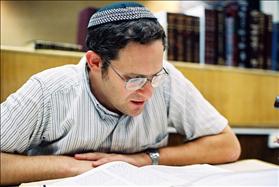Passionate, brave Orthodox leaders stand against religious coercion
Encouraging news on the modern Orthodox front
One recent development that has been the widely publicized is the joining of Yair Lapid’s Yesh Atid party by two Modern Orthodox activists – Tehilla Nachlaon Friedman and Moshe Tur-Paz
11/10/2018 22:29
Tags: Batya Kahana-Dror · Tehilla Nachlaon Friedman · Moshe Tur-Paz · Yesh Atid · Modern Orthodoxy

Mosheh Lichtenstein, source: Wikipedia
While stories like this are a testament to some dark trends of corruption, coercion, and thuggery associated with some religious extremists in Israel who ordinarily maintain a “holier than thou” posture, Hiddush has repeatedly highlighted an encouraging and growing phenomenon of Modern Orthodox rabbis, activists and intellectuals. These passionate and brave Orthodox leaders stand proudly against religious coercion and the imposition of religious strictures upon all Jews in Israel. (Unfortunately, these are the characteristics of both the ultra-Orthodox parties and the Zionist Orthodox Jewish Home party.)
One recent development that has been the widely publicized is the joining of Yair Lapid’s Yesh Atid party by two Modern Orthodox activists – Tehilla Nachlaon Friedman (until recently the chair of Ne’emanei Torah v’Avodah, a moderate Orthodox grassroots organization) and Moshe Tur-Paz (former director-general of the Jerusalem Education Authority). They are joining Modern Orthodox activists MK Dr. Aliza Lavie and MK General [Ret.] Elazar Stern, who are already part of Yesh Atid’s Knesset list.
This outlook was expressed a few days ago given by Batya Kahana-Dror in an interview to the Makor Rishon, Zionist Orthodox newspaper. Attorney Kahana Dror until recently headed a leading advocacy group, Mavoi Satum, which represents women in their encounters with Israel’s rabbinical court system and encourages couples to marry halakhically outside the Chief Rabbinate. She explains:
When you grant a monopoly to a religious court, you undermine the foundations of democracy. Human sovereignty cannot be replaced by the sovereignty of halakha…
“My vision is that of a multi-cultural, pluralistic state. Israel is a modern state, and as such it must be based on the principles of humanism, according to which man is sovereign and has the right to choose. The whole concept of the rabbinical courts is based on external authority – halakha – that requires ‘This is how things should be, and you must observe it accordingly.’ This is very problematic. The idea of elections to the Knesset is based on the assumption that man is the source of the authority. This is what democracy is; there is no other democracy. When you grant a monopoly to a religious court, you undermine the foundations of democracy. Human sovereignty cannot be replaced by the sovereignty of halakha… the continuation of the rabbinic monopoly is, in my view, a disaster for Judaism, for halakha, and especially for the State of Israel as a Jewish state. The halakhic-religious position cannot offer responses to the liberal challenge that posits man and his sentiments as the source of authority. It will not be able to continue and resolve challenges emanating from the new family [realities], which will only further increase. Halakha will turn into one big fiction. If we are humanists, then in humanism there is a principle: you may not cause suffering to others. This is the red line. The rabbinic courts cause suffering that secular women cannot comprehend. Separating religion from state will provide a response to everybody. Whoever will marry civilly will divorce civilly; that way women will not be in the status of ‘dubiously/quasi divorced,’ because of which the rabbinical courts are increasing the number of mamzerim (illegitimate children) in Israel.”